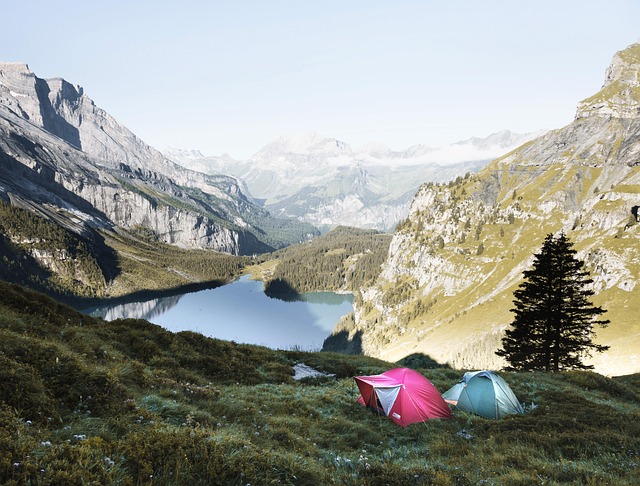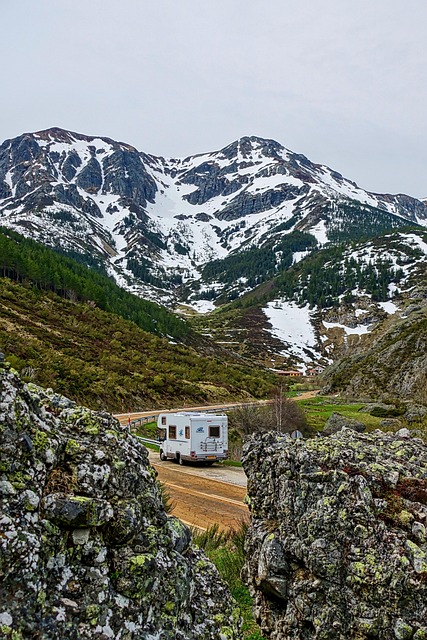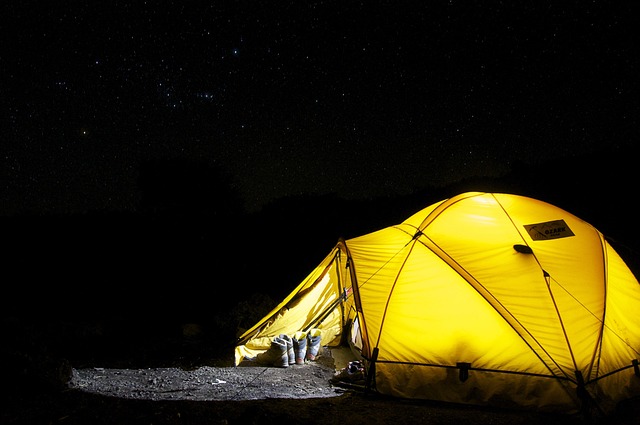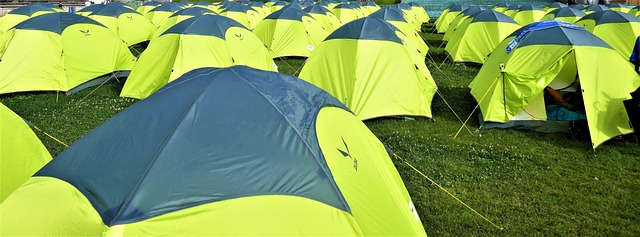National Forests: Wildlife Viewing Campgrounds for Nature Lovers

National forest locations offer vibrant ecosystems and diverse wildlife viewing opportunities. With…….
We are At Your Service
In the heart of the Pacific Northwest, nestled between the cascading peaks of the Cascade Range and the rugged coast, lies Lane County, Oregon. This diverse region boasts a rich natural tapestry, drawing outdoor enthusiasts from around the globe. At the center of its allure are the campgrounds that dot the landscape, offering a sanctuary for adventurers, families, and nature lovers seeking to connect with the wilderness. This article delves into the multifaceted world of campgrounds in Lane County, Oregon, exploring their history, impact, and evolution in response to global trends, technological advancements, and changing policies. By examining these factors, we gain a comprehensive understanding of how these outdoor retreats contribute to both local economies and the overall well-being of visitors.
Campgrounds in Lane County, Oregon, are outdoor recreational facilities designed for temporary accommodation, primarily catering to campers and RV enthusiasts. These spaces provide access to nature trails, picnic areas, bathroom facilities, and sometimes even electric hookups and water stations. The concept of campgrounds has evolved over time, from simple tent sites to fully equipped parks offering a range of amenities.
Historically, Lane County’s campgrounds have been shaped by the region’s rich natural heritage and its growing appeal as a tourist destination. The county boasts diverse ecosystems, including old-growth forests, grasslands, and coastal habitats, all of which provide unique camping experiences. Early campgrounds were often established around popular hiking trails, rivers, and lakes, serving as rest stops for outdoor enthusiasts. Over the years, with increasing demand and changing preferences, these primitive sites have transformed into modern facilities, incorporating sustainable practices and technological innovations.
The concept of campgrounds has transcended geographical boundaries, influencing recreation and tourism worldwide. International trends play a significant role in shaping Lane County’s camping industry, as global travelers seek authentic outdoor experiences. Here are some key global influences:
Sustainable Tourism: There is a growing global movement towards sustainable and eco-friendly tourism. Campgrounds in Lane County have responded by adopting practices such as waste reduction programs, renewable energy sources, and educational initiatives to raise awareness among visitors.
Glamping (Glamorous Camping): This trend involves upgrading camping experiences with luxurious amenities like cozy tents, private baths, and gourmet meals. Some high-end campgrounds in Lane County have embraced glamping, offering a unique blend of nature and comfort.
Digital Detox Retreats: With technology increasingly pervasive, some travelers seek digital detox experiences. Campgrounds can cater to this niche by providing designated tech-free zones, encouraging mindfulness practices, and organizing offline activities like stargazing or nature photography workshops.
Global Camping Networks: International camping networks and associations share best practices, promote cross-cultural exchange, and facilitate access to diverse camping destinations. Lane County campgrounds benefit from these networks, gaining exposure to a global audience.
Campgrounds in Lane County Oregon play a vital role in the local economy, contributing significantly to tourism and hospitality. Here’s an analysis of their economic impact:
Market Segmentation: Campers can be categorized into various segments based on demographics, preferences, and spending habits. Understanding these segments helps campground owners tailor amenities and services accordingly. For example, families may seek play areas and pool facilities, while backpackers might prefer primitive sites.
Seasonal Variations: The camping season in Lane County typically peaks during the summer months, with school holidays attracting large numbers of visitors. Campgrounds strategically offer different pricing structures and promotions to maximize occupancy rates year-round.
Revenue Streams: Beyond campsite fees, campgrounds generate revenue through ancillary services like concession stands, gift shops, guided tours, and activity rentals. These streams contribute to the overall economic health of local communities.
Local Businesses: Campground visitors support nearby businesses, including restaurants, general stores, and outdoor gear retailers. This indirect impact creates a positive ripple effect, fostering the growth of local economies.
Technology has revolutionized camping experiences in Lane County, Oregon, offering both convenience and novel ways to connect with nature:
Online Booking Systems: Campground owners have embraced digital platforms for reservations, allowing visitors to secure their spots remotely. These systems provide real-time availability and offer a seamless booking experience.
Camping Apps: Mobile applications provide valuable insights into campground locations, amenities, and nearby attractions. Some apps even offer interactive maps, trip planning tools, and community forums where campers share experiences.
Smart Camping Amenities: From solar-powered lighting to automated waste management systems, smart technology enhances efficiency and sustainability. Campgrounds can also utilize sensor-based water systems and energy-efficient appliances, reducing their environmental footprint.
Digital Communication: High-speed internet access at campgrounds enables visitors to stay connected while enjoying the outdoors. This is particularly important for remote work arrangements and allows campers to share their experiences on social media, generating buzz and attracting new visitors.
The development and management of campgrounds in Lane County are subject to various policies and regulations designed to protect natural resources and ensure visitor safety:
Land Use Planning: Local governments play a crucial role in land use planning, zoning, and permitting for camping facilities. These policies dictate the location, size, and amenities of campgrounds to preserve natural habitats and maintain scenic beauty.
Environmental Regulations: Campgrounds must adhere to strict environmental standards regarding waste management, water quality, and energy consumption. Permits are required for activities like road construction, reforestation, or infrastructure upgrades.
Wildlife Management: Lane County’s diverse wildlife requires careful consideration in campground development. Policies address measures to minimize human-wildlife conflict, protect endangered species habitats, and educate campers about responsible wildlife viewing.
Public Safety: Regulations cover emergency services, fire safety, and accessibility for people with disabilities. Campground owners must comply with building codes and maintain adequate insurance coverage.
Despite their popularity, campgrounds in Lane County face several challenges that require strategic solutions:
Increased Visitor Demand: The rising demand for camping experiences can strain resources and infrastructure. Campground owners must invest in capacity expansion while ensuring the preservation of natural settings. Balancing development with sustainability is a key challenge.
Competition from Commercial Resorts: Privately owned resorts often offer luxurious amenities, competing directly with campgrounds for visitors. To stay relevant, campgrounds need to differentiate themselves by emphasizing unique experiences and natural surroundings.
Environmental Concerns: As camping popularity grows, so do environmental pressures. Campground operators must address issues like littering, off-trail hiking, and the impact of increased vehicle traffic on local roads.
Regulatory Compliance: Staying updated with changing policies and meeting regulatory requirements can be demanding. Campground owners need access to resources and support to navigate these processes effectively.
Solutions and Strategies:
Located in the heart of Lane County’s forest lands, Whittaker Peak offers primitive tent sites surrounded by old-growth trees. The campground successfully incorporates sustainable practices, including composting toilets, greywater recycling, and solar-powered lighting. They host regular workshops on natural crafts and wilderness survival skills, engaging visitors in environmental education. This holistic approach has made Whittaker Peak a top choice for eco-conscious campers.
This modern campground sits along the scenic Newberg River, providing luxurious glamping experiences. The resort offers yurt accommodations with comfortable beds, private baths, and outdoor firesides. Newberg River Resort also promotes environmental stewardship by implementing a comprehensive recycling program and offering guided nature walks to raise awareness about local ecosystems.
Managed by the U.S. Forest Service, these campgrounds showcase successful collaboration between government agencies and private landowners. Siuslaw National Forest offers diverse sites, from primitive tent areas to RV-friendly spots with electric hookups. They provide excellent access to hiking trails, river rafting opportunities, and scenic drives, attracting a wide range of outdoor enthusiasts.
The future of campgrounds in Lane County, Oregon, looks bright, with several emerging trends and growth areas shaping their evolution:
Off-Grid Camping: There is a growing interest in off-grid camping experiences, where visitors disconnect from modern conveniences to immerse themselves fully in nature. This trend presents opportunities for remote campsite development and innovative waste management solutions.
Wellness Retreats: Campgrounds can tap into the wellness tourism market by offering retreats focused on mindfulness, yoga, and natural health practices. These retreats cater to those seeking rejuvenation and a reconnection with nature.
Educational Programs: Expanding educational offerings, such as outdoor classrooms, birding workshops, or environmental conservation programs, can attract families and school groups. These programs enhance the camping experience while fostering a deeper understanding of local ecosystems.
Digital Integration: While embracing technology for convenience, campgrounds should also prioritize maintaining a connection with nature. Future developments could include interactive nature apps, virtual reality experiences, or augmented reality trails to enhance visitor engagement without compromising the outdoor setting.
Campgrounds in Lane County, Oregon, are more than just places to rest; they serve as gateways to exploration, education, and rejuvenation. From their historical roots to modern innovations, these outdoor spaces have evolved to meet the diverse needs of travelers while preserving the natural beauty that attracts them.
The global impact of Lane County’s campgrounds is evident in their influence on sustainable tourism practices and their ability to cater to a wide range of preferences. As technology continues to shape the industry, campgrounds will need to adapt, ensuring they remain relevant and appealing. By addressing challenges proactively and embracing emerging trends, these outdoor retreats can contribute significantly to local economies and the overall well-being of visitors for years to come.
Q: Are Lane County campgrounds suitable for families with young children?
A: Absolutely! Many campgrounds in Lane County offer family-friendly amenities, including play areas, swimming pools, and organized activities for kids. Some even provide baby-sitting services or on-site child-care facilities.
Q: What are the best camping spots for stargazing?
A: Lane County’s remote locations, especially in national forests, offer exceptional stargazing opportunities due to minimal light pollution. Look for campgrounds near high elevation areas or those with designated dark sky sites.
Q: Can I bring my pet to a Lane County campground?
A: Pet policies vary across campgrounds. Some allow well-behaved pets in certain areas, while others have strict rules regarding leashing and cleaning up after pets. It’s best to check individual campground websites or contact them directly for specific details.
Q: Are there any campgrounds suitable for large groups or events?
A: Yes, several campgrounds in Lane County accommodate large groups and offer facilities for special events like weddings, retreats, or corporate gatherings. These sites typically have larger spaces, meeting areas, and catering options.
Q: How can I find the best deals on campground reservations?
A: Online booking platforms often offer discounts and promotions. Some campgrounds also have loyalty programs or seasonal rates. Checking local tourism websites and subscribing to campground newsletters can keep you informed about special offers.

National forest locations offer vibrant ecosystems and diverse wildlife viewing opportunities. With…….

Securing a spot at a Lakeside campground requires understanding your preferences and researching opt…….

Lakeside campgrounds offer immersive guided walks highlighting natural beauty and biodiversity. Tran…….

Family-friendly campgrounds offer a blend of outdoor activities and amenities for all ages, from nat…….

Campfire programs in RV parks transform them from rest spots to community hubs, offering storytellin…….

National forest locations offer pet owners scenic and remote camping sites for dogs on leashes. Chec…….

Lakeside campgrounds offer an eco-conscious outdoor escape with natural beauty and sustainable pract…….

National forest locations offer a unique blend of natural beauty and outdoor adventures, featuring s…….

Family-friendly campgrounds offer prime stargazing with minimal light pollution, clear skies, and ed…….